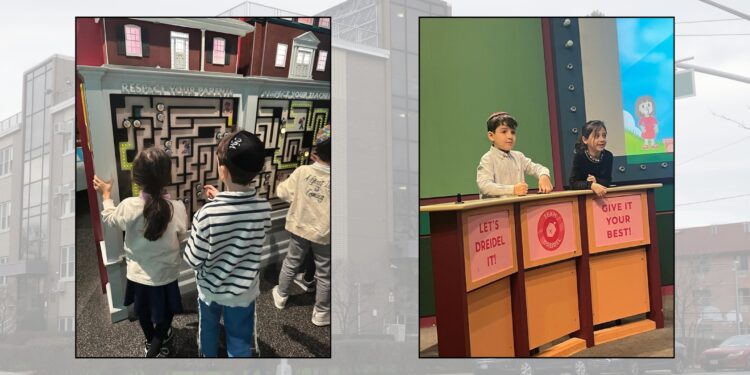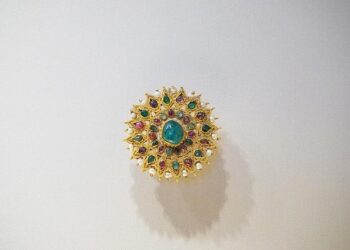Students at Schechter Queens/Queens Hebrew Academy participate in school activities. (Courtesy Schechter Queens/Queens Hebrew Academy)
Some in the Queens Bukharian community have taken the renaming of the school as a sort of triumph over non-Orthodox religious ideology. Inaccurately saying that the school had been associated with Reform Judaism, an anonymous Instagram account that posts about happenings in the community posted, тАЬThe school is once again on the right path and the only way.тАЭ
The post garnered dozens of likes. But some responded lamenting the change. тАЬEspecially in these times, it is honestly beyond upsetting to see so many members of the Jewish community excited that anyone who isnтАЩt Orthodox no longer has somewhere to send their kids in Queens,тАЭ wrote Sarah Schraeter, a Queens artist who said she had been considering the school for her 3-year-old child amid concerns about antisemitism in public schools.
Chazan emphasized that the school would continue to call itself a тАЬday school,тАЭ which is used beyond Orthodoxy, rather than a тАЬyeshiva.тАЭ She also said the schoolтАЩs pivot toward Orthodoxy and away from Conservative Judaism shouldnтАЩt be cause for a тАЬvictory lapтАЭ for anyone.
тАЬThe only reason [we are here today] is because of the success of the school for the first 68 years of its life, and because of the Conservative Jewish lay leaders and rabbis that felt they saw the need to have this school that was not a strictly Orthodox yeshiva, that was a day school that was more accepting of different religious practices,тАЭ Chazan said.
тАЬWe want it to be a smooth transition and evolution, rather than, тАШGoodbye, and here we are as a new entity,тАЩтАЭ she added. тАЬItтАЩs important to me that the future generations of this school know the history and know why thereтАЩs a school there.тАЭ
For some observers of American Judaism, Schechter QueensтАЩ renaming was in some ways inevitable.
Support the New York Jewish Week
Our nonprofit newsroom depends on readers like you. Make a donation now to support independent Jewish journalism in New York.
тАЬAmerican Jewry is diversifying demographically. ItтАЩs no longer the overwhelmingly Democratic and Eastern European community of my youth. Just look how many Queens Jews voted Trump,тАЭ Gil Troy, a Schechter graduate and American presidential historian, wrote in an essay about the schoolтАЩs renaming. (The Republican presidential candidate drew more than 75% of the vote in the districts immediately surrounding the school in NovemberтАЩs election.)
Troy recalled portraying Haym Salomon, the Sephardic Jewish merchant who financed the Continental Congress during the Revolutionary War, in a fourth-grade play. He described a feeling of both Jewish and American identity, and a commitment to Zionist ideals, that he suggested are harder to come by in liberal Jewish denominations today.
тАЬToday, Conservative Judaism, which thrived in a middle-class-oriented, temperamentally-moderate America, faces severe ideological, demographic and institutional challenges,тАЭ wrote Troy, who now lives in Israel and recently published a book called тАЬTo Resist the Academic Intifada: Letters to My Students on Defending the Zionist Dream.тАЭ
Chazan said the changes at the school were more practical than ideological.
тАЬWe had a choice,тАЭ she said. тАЬWe could either close, or we could evolve to meet the needs of the changing Jewish community. And we decided that itтАЩs more important to provide a solid Jewish education to families in the area than to just stand on our laurels and say, тАШBut we are a Conservative school.тАЩтАЭ
Chazan is herself the parent of two Schechter graduates, the younger of whom finished eighth grade in 2013, and has long prayed in egalitarian synagogues in the area.
тАЬIt was very difficult for us to accept the fact that our community is no longer providing the students for the school,тАЭ she said. тАЬWe just needed to make these changes so that the community that makes up the vast majority of our families feels that theyтАЩre getting an authentic minyan, something that is meaningful to them, and that theyтАЩre in a school that makes sense to them.тАЭ
In Hollis Hills, where Chazan lives, her Bukharian neighbors have raised children who have now established their own families in the neighborhood.
тАЬI realized that for years, white Ashkenazi Jews like me have been the majority, and that other people have had to try to fit into our mold тАФ and now I have to fit into another mold,тАЭ Chazan said. тАЬThatтАЩs just the way it goes: Evolve or die. I donтАЩt think itтАЩs a bad thing. I think this is the community of Jews that is thriving right now in this location.тАЭ
Jewish stories matter, and so does your support.
Source link : http://www.bing.com/news/apiclick.aspx?ref=FexRss&aid=&tid=677d3f28106145cb9562e47b3722f3ab&url=https%3A%2F%2Fwww.jta.org%2F2025%2F01%2F06%2Fny%2Ffirst-ever-solomon-schechter-day-school-in-north-america-goes-orthodox&c=6326278961783797983&mkt=en-us
Author :
Publish date : 2025-01-06 13:55:00
Copyright for syndicated content belongs to the linked Source.










